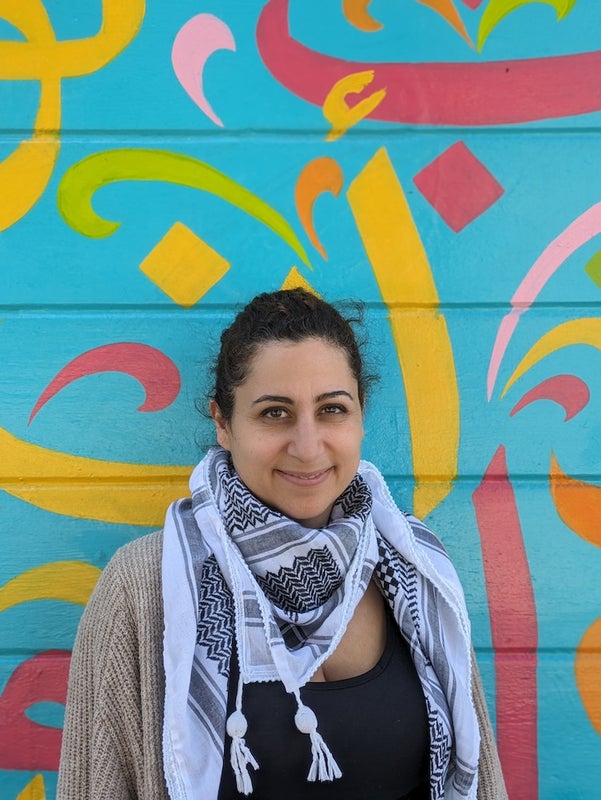
Reem Assil has created a restaurant in the Mission that serves some of the most beautiful, delicious, and activist food of any new spot in San Francisco in a long, long time.
Reem was born and raised in her early years in a Boston suburb. Her dad is from Damascus, Syria, and her mom is from Gaza, Palestine. Both were refugees in 1967. They met in Beirut and emigrated to the East Coast of the US.
The suburb where they moved was predominantly white, but Reem's household was vibrant in Arab culture. Her parents didn't want the family to forget their roots. They were in Massachusetts because that's where the jobs were. But Reem's mom's family all came to California, which ended up having quite an effect on her.
Her grandparents went to Northridge just before the 1994 earthquake that devastated that area. Reem says that, every summer, relatives from all over the world, including her and her family from out east, converged on her grandparents' home in the San Fernando Valley.
She talks about the strength of that Arab culture in her home and among her relatives in California, but also, of reconciling that with the fact that she was a latch-key kid, especially when her mom went back to work. Reem was immersed in US culture, but felt those strong roots of her ancestors.
In the late-Eighties and early Nineties, Reem was into Ska and "alternative" music, but also hip-hop. "Growing up Palestinian, you're aware of the world in a different way," she says. She's always had an affinity for justice. She talks about a history teacher she had in high school who had a big influence on her.
In that class, she learned much more about the Civil Rights movement than anyone can get from a textbook. She went on several trips with that class, including to the Deep South. Being embedded like that, talking with people who lived the movement, had an enormous effect on Reem. In 1994, she joined her family on a trip to Gaza. She was 11 and the experience "wrecked" her. The stories she heard in the South resonated and reminded her of what she knew about her mom's homeland.
Reem is the oldest of three sisters and says that hers was a very feminine household. As a kid and teenager, she had an affinity for cooking and baking. But as she navigated her more formative later teen years, she rejected the idea of women in the kitchen. Food would come back much later in her journey.
She had just begun college at Tufts University in 2001 when her parents got divorced and 9/11 happened. She and other Arab folks had always dealt with Islamophobia, but that ramped way, way up after Sept. 11. That and her being the first to leave her house put a strain on her parents' relationship as well as her own life. She rejected the US-centric foreign policy ideas she was hearing and being taught at Tufts.
She visited Lebanon and Syria in 2002, and when she returned to the US, she developed what she thought was a parasite. She couldn't eat. That affected her studies and her social life. It all coalesced and devolved into depression, and this further negatively affected her relationship with food. Reem quit college and made her way to California.
At first, she considered her grandparents' place in Southern California. But she figured that LA would depress her further. An aunt, a white hippie from Humboldt, and an uncle who was an activist lived in Daly City, though, and felt more her speed. She didn't know much about the Bay Area other than an impression she got earlier in life when she came out for their wedding. They were the main attraction.
She arrived in 2002, just as organizing around the then-proposed invasion of Iraq was taking place. Her aunt and uncle worked during the days and went to anti-war meetings at night. Reem went with them, and she cites these experiences as helping raise her out of that funk she'd been in—it lit a fire in the activist part of her life.
While all this was going on, she'd also visit farmer's markets with her aunt and uncle. Fresh produce was somewhat foreign to Reem when she was growing up out East. Her relatives cooked a lot, and Reem would join them. It slowly brought the joy of cooking and eating back into her life.
She spent a lot of time in the Mission in those days, and even helped found the AROC (Arab Resource Organizing Center) on Valencia. When she wasn't organizing, Reem was heading north to Mendocino and Humboldt, discovering the natural beauty that surrounds the Bay Area. She went back to Tufts to finish getting her degree, then headed back to Northern California as soon as she could.
In 2005, Reem got a job here with an activist group. After doing community organizing, she got into union organizing, eventually working with SFO workers. From there, she got into policy work.
She also started playing soccer—with an anti-imperialist team, no less. It was more than just exercise for Reem—the people she played with were her "church."
Check back next week for Part 2 and hear how Reem decided to make and sell and celebrate the food of her heritage.
We recorded this episode at Reem's California in May 2024.Photography by Jeff Hunt
Subscribe to Podcast
https://storiedsf.libsyn.com/rssOr, search for “Storied: San Francisco BFF.fm” anywhere you listen to podcasts.

